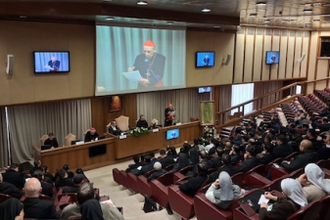Reflection: Peace in our relationships and communities

Photo by Javardh on Unsplash
Canon Rob Esdaile gave this reflection addressing violence and abuse in our homes, families and wider communities at the Arundel and Brighton J&P Assembly recently.
There are two questions I want to ask today: what has our Christian faith got to say about peace in our relationships and communities? And, secondly: are we part of the solution (as the Church normally assumes) or part of the problem? I am going to start by reading a well-known poem by Brian Wren:
Say "No" to peace
if what they mean by peace
is the quiet misery of hunger,
the frozen stillness of fear,
the silence of broken spirits,
the unborn hopes of the oppressed.
Tell them that peace
is the shouting of children at play,
the babble of tongues set free,
the thunder of dancing feet,
and a father's voice singing.
Say "No" to peace,
if what they mean by peace
is a rampart of gleaming missiles,
the arming of distant wars,
money at ease in its castle,
and grateful poor at the gate.
Tell them that peace
is the hauling down of flags,
the forging of guns into ploughs,
the giving of fields to the landless,
and hunger a fading dream.
Brian Wren's poem has something important to say specifically in the face of the issues we're exploring today. Peace is not the absence of fighting. Peace is not the cowed existence of those who are controlled, gas-lighted or robbed of their ability to think for themselves. Peace is not the imposition of a constant threat of violence or the sapping of a community's will to resist. A peace without any uproar is not biblical peace, because true peace is a fruit both of justice and of the action of the Spirit, who blows where She will. There's something disturbing, unsettling, change-making about real peace, for it is about restored relationships, mutual respect, making room for the other and their dreams; about a trust that each person and each culture has not only an intrinsic God-given value but also a unique contribution to make, a gift to share for the good of all. Peace is the enabling of that sharing.
The Children of Abraham have a great story to tell when it comes to peace, especially peace in personal relationships. It's there in Genesis 1. Male and female we were created, in the image and likeness of God, made for mutuality, endowed with complementarity. We are the summit of God's creative oeuvre - adding the 'very good' to the merely 'good' of the fruits of the previous five days of Creation, whatever the ambiguities implicit in our 'dominion' over the birds of the air and the fish of the sea and the creatures of the land, ambiguities vividly displayed in the ecological crisis of our days.
The second Genesis creation myth describes the uniqueness of our being, in the admixture of earth and air, flesh and spirit together, and names the erotic relationship, too: Eve is taken from the side of Adam to satisfy a need which can never be satisfied by mere objects. Adam finds real delight only in the recognition: "'This at last is bone of my bones and flesh of my flesh ...' Therefore a man leaves his father and his mother and clings to his wife, and they become one flesh." (Gen 2.23-24) Jesus used that last text to express his own theology of marriage, adding the conclusion: "So they are no longer two, but one flesh. Therefore, what God has joined together, let no one separate.' (Mk 10.8-9)
That's the positive Judaeo-Christian image of Marriage and Eros - the delight in the other, the desire for the other, the honouring of the other, and the consequent creation of a shared identity and vocation.
But there's a darker side to the history of human intimacy, expressed in Genesis 3: the eating of the fruit of the tree of the knowledge of good and evil has various destructive effects. The couple firstly discover shame, the realisation that nakedness is problematic. Then they resort to mutual accusation (''The woman whom you gave to be with me, she gave me fruit from the tree, and I ate.' - Gen 3.12) and then finally their relationships both to the natural world and to each other are poisoned: "To the woman God said, ' … in pain you shall bring forth children, yet your desire shall be for your husband, and he shall rule over you.' And to the man God said, ' … cursed is the ground because of you; … By the sweat of your face you shall eat bread until you return to the ground, for out of it you were taken …'" (Gen 3.16-19)
If we want to create a world at peace, we really need to take seriously the flawed and conflictual nature of our being. Remember that myth tells us what is always and everywhere the case. The story-book language may be hard for our rationalist heads to absorb but if we insist on saying that we're all 'reasonable people', free of the capacity to do deeply evil things, we are very ill-equipped to think our way beyond those primal urges or to create a society in which those dark forces are confronted and tamed in a healthy manner.
Quite properly, we do not want to label children as 'bad' or 'naughty'. In reaction to past disciplinarianism, we may be tempted to idealise them, as "naturally good." They are, but they are also manipulative, calculating, dedicated to ensuring their own needs are met and prone to evading responsibility for their actions - in other words, flawed and 'fallen', just like the rest of us. That, rather than wrong actions, is the truth expressed by the term 'Original Sin'. And not all disciplining of children can be based on asking them whether they "made a wise decision."
That leads me to my second question: Are we Christians part of the solution or part of the problem when it comes to issues of domestic violence and social order? We certainly talk a good talk. We hold up a shining ideal of what marriage should be and how families should be and how societies should be, and yet for most of its history the Church has tolerated slavery, denied female autonomy and had a strong urge to cover up sexual abuse in order to protect the institution's 'good name'. How did the wonderful vision of human flourishing in the Scriptures become so poisoned? Sin (with a capital 'S') and Fallen-ness again.
One mistake we make is to deny the differences between ancient and modern worldviews and mores. When it comes to marriage, blithely to apply the categories derived from a clan-based system of arranged marriages (in which the woman had little autonomy - and no possibility, in extremis, of leaving) to contemporary relationships based on mutual attraction, personal autonomy and legal equality is, to say the least, problematic. What was once the 'glue' of the relationship and (when it worked) a safeguard for the woman - namely family honour combined with societal expectation of fidelity - has very little adhesive quality in a secular society which presumes people will have multiple sexual partners across their (now significantly longer) lifetimes and where 'honour' is not a key motivator. In our culture the vision of a vocation to "become one flesh", the calling which Jesus himself offered, has to be taught as a freely adopted spiritual path, an ascesis. Our young (and not-so-young) have to be shown that its possibility depends on a decision to live by counter-cultural values and to build life together on a spiritual foundation.
It took the Catholic Church until Vatican II to embrace 'Covenant', rather than 'Contract', as the key category in understanding human loving, with God's relationship with Israel as the paradigm for Christian marriage. A covenantal model sees life together as a journey, a journey marked by growth, change, failure and forgiveness, with new beginnings after each betrayal. It has much to commend it. It is hope-filled and future-oriented, allowing us to transcend past limitations. It moves beyond talk of 'rights' and 'duties' to talk of mutuality and a shared life. The limitation is that God's Covenantal Love is, by definition, eternal, able to start over after every betrayal - whereas human relationships can sometimes reach a pass where the covenant is irredeemably betrayed and an abused partner has - one could even say - a duty to leave.
We would do well to spend time with the woman at the well in Samaria in Jn 4, the woman who - as Jesus tells her - has had five husbands (and the one she is with now is not her husband). She could not divorce any of those men. Rather, she is a multiple victim of abusive relationships, one who has been put on the discard pile of life, with her social standing (and presumably her self-esteem) reduced with each subsequent eviction from the family unit. Jesus is probably the first person in her entire life to treat her as an equal, to engage with her opinions, and then to give her 'living water', something to satisfy her search for a sense of self and a sense of worth. He is probably the first man since her first wedding day not to shame or belittle or gaslight her. She goes home that night to sleep with husband number five (or is it six?) not as a sinner but as an apostle: "'Come and see a man who told me everything I have ever done! He cannot be the Messiah, can he?" (Jn 4.29) What had been a burden and a dirty little secret becomes a source of life. She is given back her community and becomes someone able to speak with authority to her neighbours, instead of hiding from them by coming to the well-head at noon. She is un-shamed, un-condemned, given her life back.
That is the task of the 'Field Hospital Church' of which Pope Francis speaks so movingly: to listen to people's hearts and to dress their wounds - which are many and deep, perhaps especially in their personal relationships and their family life - and then to mission them to live from the place of forgiveness. "The name of God is mercy," as Pope Francis reminded us by the Extraordinary Jubilee Year of 2016. And the experience of mercy requires of us that we confess our woundedness in order then to educate ourselves (and the next generation, too) to eschew power-play and the abuse of authority over each other - both the explicit language of threat and the unspoken gestures of passive-aggression. We each need to do 'Soul work' to prevent yesterday's wounds becoming tomorrow's wrongs - and the Christian community needs to unpack the tools our Tradition has given us to bring about this transformation.
God's love is profoundly realistic, recognising our limitation and working to build something beautiful out of our brokenness. "For [as St Paul discovered at his own conversion] it is the God who said, 'Let light shine out of darkness', who has shone in our hearts to give the light of the knowledge of the glory of God in the face of Jesus Christ. But we have this treasure in clay jars, so that it may be made clear that this extraordinary power belongs to God and does not come from us." (2 Cor 4.7-8) "There is a crack in everything / That's how the light gets in", as Leonard Cohen understood.
When we turn from the domestic to the political and the international (and I really haven't time to explore this in the way it deserves) we find some of the same features - a brilliant set of resources, a noble discourse, and almost universal failure to live up to it. On the one hand, not only do we have the sixth commandment but Jesus' radicalisation of it in the Matthean Antitheses, whereby angry and murderous thoughts are said to be as worthy of punishment as homicide and where, awkwardly, we are bidden to love our enemies and to pray for those who persecute us. (Mt 5.21-2, 38-45) In the Beatitudes we have the promise, "Blessed are the peacemakers, for they will be called children of God." (Mt 5.9) In the Old Testament we have the prophetic injunction to beat swords into ploughshares and spears into pruning hooks (Isa 2.4) and the promise that in the days of the Messiah "The wolf shall live with the lamb." (Isa 11.6) And in Psalm 46 we are bidden to be still and know the God who "makes wars cease to the end of the earth …" (Ps 46.9)
And then we have the lived reality of Constantine saying of the cross, "In this sign I have my victory," and the many ways through history that Throne and Altar have become an oppressive alliance. We have the painful memories of both Crusaders and Conquistadores undertaking land-grabs and indiscriminate killing "for the greater glory of God." In 2019 Westminster Abbey hosted a service to celebrate 50 years of this country's continuous at-sea nuclear deterrent without questioning our willingness to wreak destruction of innocent lives and of the biosphere on such a scale that human life might cease to be viable.
We have in our Tradition the elaboration of 'Just War' theory - a way of reasoning which, while it may have limited violence at times (though clearly neither in Gaza at present nor in the carpet-bombing of Germany in World War Two) has proved singularly unable to protect non-combatants, let alone actually to prevent wars. In fact, the language of 'Just War' has often been used to baptise existing conflicts as a struggle between our own perceived good and our opponents' named evils. But no war can be 'just' in any deep sense. War is always a failure of the human spirit, a betrayal of hope, an obstacle to the right relationship that the peace of Christ invites us to pursue. It always leads to fresh injustices and new hatreds. "In war, everyone loses," as Pope Francis has repeatedly insisted.
Perhaps, as with the case of personal relationships the healthy response for the Church is, firstly, to recognise and name the sinful nature of our reality - and our own implication in that fault; in other words, the path of confession and metanoia (conversion). Secondly we need to seek alternatives to the resigned acceptance of violence as an inevitability in human affairs. We have to create oases of reconciliation, examples of other ways of resolving conflict, projects that make the possibility of peace tangible and the search for peace urgent. We are bidden to seek first the Kingdom of God and God's righteousness. (Mt 6.33) Loving our neighbours is what we are about - and in the story of the Good Samaritan we discover to our horror that our enemy is also our neighbour. When we finally understand that, we shall also "know that the Kingdom of God is among [us]." (Lk 17.21)
Meanwhile, "Say "No" to peace if what they mean by peace is the quiet misery of hunger, the frozen stillness of fear, the silence of broken spirits, the unborn hopes of the oppressed."


















